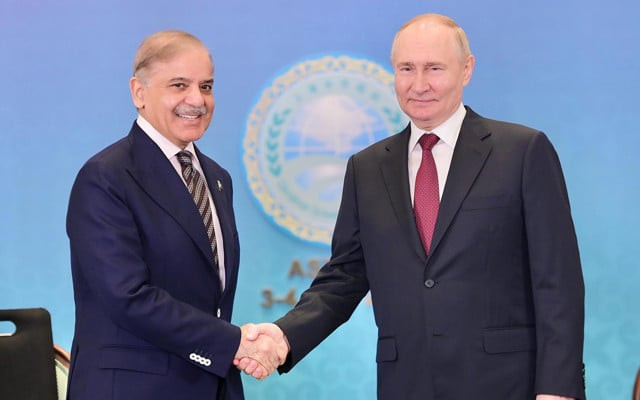Pakistan eyes multi-billion-dollar LNG pipeline deal with Russia
Putin proposed construction of LNG pipeline that would pass through Iran to Pakistan and connect to India

The coalition government led by Prime Minister Shehbaz Sharif is exploring a multi-billion dollar agreement with Russia for the construction of a liquefied natural gas (LNG) pipeline, according to media reports.
This strategic move follows a recent offer by Russian President Vladimir Putin during his meeting with PM Shehbaz on the sidelines of the Shanghai Cooperation Organisation (SCO) summit.
Putin proposed the construction of an LNG pipeline that would pass through Iran to Pakistan and potentially connect to India.
During their discussion, PM Shehbaz emphasized the potential to enhance bilateral trade between Pakistan and Russia, expressing a desire to work closely with President Putin to strengthen their relations further. Currently, the two nations share a bilateral trade volume of $800 to $900 million annually, with plans to significantly increase this figure in the coming years.
Senior officials disclosed that various ministries are conducting preliminary studies, with Petroleum Minister Musadik Malik tasked with evaluating viable options. These efforts must consider the sanctions imposed by the United States on both Russia and Iran.
The relevant ministries are also assessing how to increase trade to $20-$25 billion per year, taking into account regional and global dynamics. Multiple routes for the LNG pipeline are being considered, as past efforts for regional energy connectivity, including power and gas projects, have not come to fruition despite significant promotion over recent decades.
Russia's reduced trade with European countries—down by 70%—has prompted Moscow to seek new markets, including South Asia. This proposed LNG pipeline project revives a history of cooperation between Islamabad and Moscow. In 2015, the two countries agreed to build a 1,100-kilometer pipeline to transport imported LNG from Karachi to power plants in Punjab.
Sources indicate that Islamabad is keen to proceed with the Russian LNG project without provoking the US. Various options are being explored to achieve a balanced outcome that benefits all parties involved.
However, US sanctions present a major obstacle to this project. Washington's sanctions against Russia and those engaging with Moscow threaten another significant initiative: the 1,900-kilometer Pak-Iran gas pipeline. Despite an agreement signed in 2010, progress within Pakistan has stalled due to fears of US sanctions. This pipeline was intended to supply 750 million to one billion cubic feet of natural gas per day for 25 years to meet Pakistan’s energy needs.
For the LNG project with Russia, Pakistan may need to adopt a strategy similar to Turkey's, which managed to secure a commercial agreement without facing severe repercussions from US sanctions.



















COMMENTS
Comments are moderated and generally will be posted if they are on-topic and not abusive.
For more information, please see our Comments FAQ